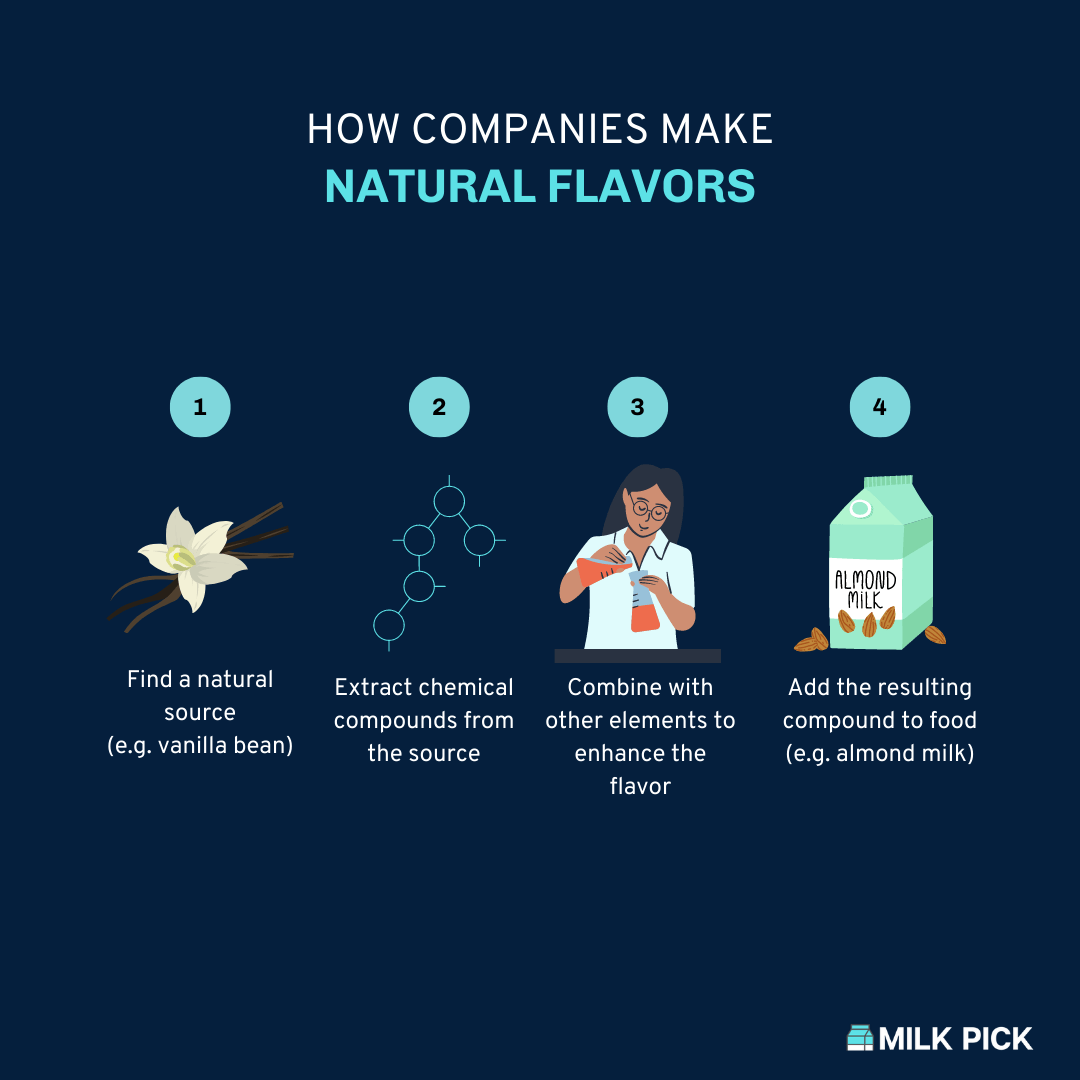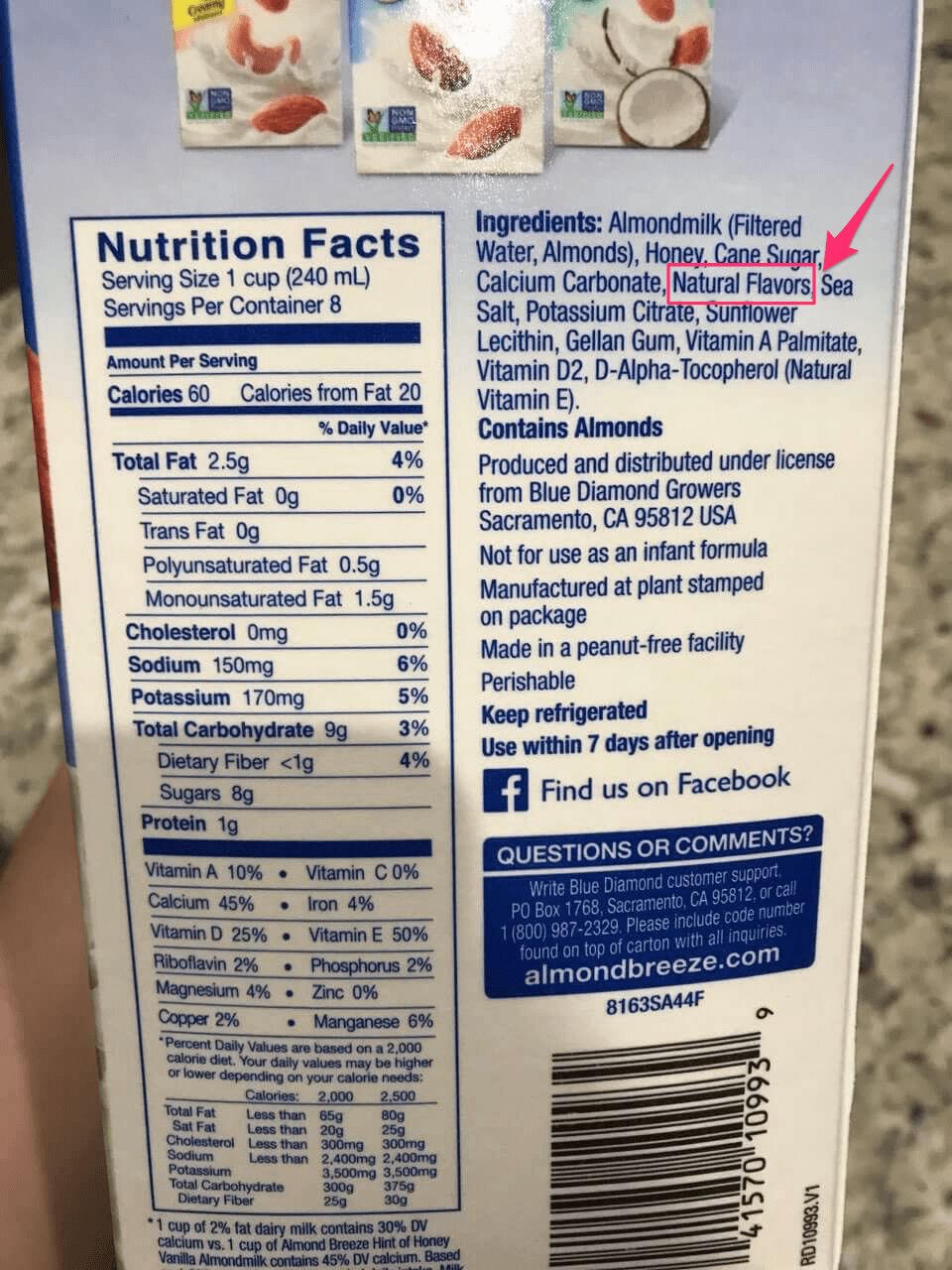Don’t let the word “natural” have you fooled. Natural flavoring is most likely not something you want to see on the label of your plant-based milk.
Natural flavor is any flavor that is derived from either a plant or animal source that has been created in a lab. Natural flavor in almond milk is designed to improve the taste, but with no FDA requirement to disclose what is in the natural flavor, it is a mystery ingredient with unclear health effects.
Let's take a closer look at what natural flavors are, why it's so common in almond milk, and whether or not you should consume it.
What is Natural Flavor?
A natural flavor is any substance that can be derived from a plant or animal that is found in nature. By definition, they do not add any nutritional value to the food item or beverage.
According to the Food and Drug Administration (FDA), natural flavor must be created from one of the following sources:
- Spices
- Eggs
- Dairy products
- Meat, poultry, seafood
- Edible yeast, herbs, bark, buds, root leaves or plant material
- Fruit or fruit juice
- Vegetable or vegetable juice
- Fermented products
Unfortunately, at this time, genetically modified crops still qualify as “natural” and can be used to create natural flavors as the FDA definition of natural does not exclude them.
Needless to say, there is a lot of room for interpretation in what constitutes a “natural flavor.”
This makes the definition a bit more vague than you would anticipate with the word “natural” being in its name.
Natural Flavors vs. Artificial Flavors
While natural flavors and artificial flavors technically aren't the same, they're very similar.
Both enhance the flavor of food and both are made in labs.
The difference is natural flavors are derived from a natural source and artificial flavors are synthetically created to mimic the flavor of real food.
You might see some milk labeled as "naturally and artificially flavored." According to the FDA, that means:
It is a signal that the original source of the flavor may not have been used in the food.
FDA Website
How Do Companies Create Natural Flavors?
Natural flavors can be derived in many forms from the original whole food source.
Essentially, chemists extract particular chemical compounds from the natural source that are known to amplify the flavor of the food.
The FDA approves the use of natural flavors in the form of essential oils, essence, oleoresin, protein derivatives, and distillation.
In order to obtain these natural flavors, chemists typically have to heat or roast the whole food source.
Other times, they end up using enzymes that will break down the whole food source to obtain the specific chemical.
The manufacturer is not required to delineate which form of the natural product is being used or even which natural food they are using to create the flavor.
This means that animal products could technically be used to create natural flavors for plant-based products, which can be misleading.

Why is Natural Flavoring Used?
You could probably guess by the name that natural flavors are used for flavoring. And you’re certainly not wrong.
The primary motivation for incorporating natural flavors is to create an intensely satisfying taste to improve your experience as a consumer.
This, in turn, results in you wanting to repurchase the product again and again, which is the aim of any food or beverage company.
Now it’s not an inherently bad motivation because that is the nature of business.
However, when they make these decisions, they aren’t necessarily putting your health and wellness at the forefront of their interests.
In some cases, natural flavoring may also be used to reduce the expenses associated with producing a food or beverage item.
For example, a company may use banana flavoring to reduce the number of bananas that need to be used in a given product.
Here's a news clip from WCCO CBS Minnesota that gives more insights into why companies use natural flavors.
Why is Natural Flavoring in Almond Milk?
Many almond milk companies use natural flavoring to spice up the taste of their product.
All it takes is one trip down the grocery aisle to see variations of vanilla, chocolate, or extra creamy almond milk.
However, if you stop to read the label on the back of a commercial vanilla almond milk you may be surprised. You may not even see vanilla in the list of ingredients.
Instead, you will typically see natural flavors in its place, meaning that they used some chemical combination from a natural source to produce that flavor.
This may produce “tastier” almond milk. But in reality, it leaves you unsure of exactly what you’re consuming and the effect that the chemical compound may have on your body. This is particularly relevant for you if you have any known food allergies.
Are Natural Flavors Safe to Consume?
With all this new knowledge about natural flavors, you’re probably wondering if they are safe to consume.
The honest answer is no one can guarantee that it’s safe because producers are not required to report what they are using to make the natural flavor at this time.
The lack of disclosure regarding what is in a natural flavor also presents an issue when it comes to accuracy and consistency with research regarding the safety of consumption of these products.
The Flavor Extract Manufacturer’s Association (FEMA) has presented research that generally concludes it is safe for most of the population to consume natural flavors.
But as time goes on and more of these natural flavors are being used in our food and beverages, other researchers are noticing adverse impacts on part of the population.
Some of the documented side effects of consuming items with additional natural flavorings include:
- Skin rash
- Migraines
- Kidney dysfunction
- Sleep disturbance
- Gastric issues
In general, a good rule of thumb is to consume a food or beverage that is as close as possible to its natural form for your health.
How Do You Know If Your Almond Milk has Natural Flavors?
Spotting natural flavors in almond milk is as simple as reading the ingredient list on your commercial almond milk.
Located on the food label towards the bottom, you will see the ingredient list. There are no hidden names of these flavors that you need to spot. It will literally be listed as “natural flavors” or “natural flavoring.”
Some flavored almond milk might also use terms like:
- Natural vanilla flavor
- Natural chocolate flavor

If you are going to opt for almond or plant-based milk that has natural flavors, make sure it’s at the bottom of the ingredient list.
The ingredients on the ingredient list are ordered from the highest amount in the product to the lowest amount in the product.
By assuring it’s at the bottom of the ingredient list, you know it’s less likely to be heavily used in the product.
Luckily, there are many brands of plant-based milk that opt not to use natural flavors.
And better yet, you can make your own almond milk at home and flavor it with truly natural items like a date, vanilla bean, or cinnamon.
Here's an easy recipe from EatMoveRest.
There’s Nothing Natural About Natural Flavors
Natural flavors were designed to enhance the flavor of a food item or beverage.
They are derived from plant or animal sources, but they are still chemical compounds produced in a lab that should leave you with some questions as a consumer.
While the FDA does have requirements for what constitutes a natural flavor, they do not require products to disclose how the flavoring is produced or what flavor sources are being used in a product.
In the case of almond milk, the natural flavors are there to make the beverage more enjoyable and flavorful to increase the desirability of their product.
The research is limited and mixed regarding the impact of natural flavors on your health primarily because of the lack of disclosure as to what constitutes “natural flavor” in a product.
When it comes to consuming almond or plant-based milk, it’s best to opt for a version without natural flavors to avoid any negative impacts on your health.
Better yet, you can make your own almond milk at home and add truly natural flavor enhancers in the form of dates or spices of your choice!
